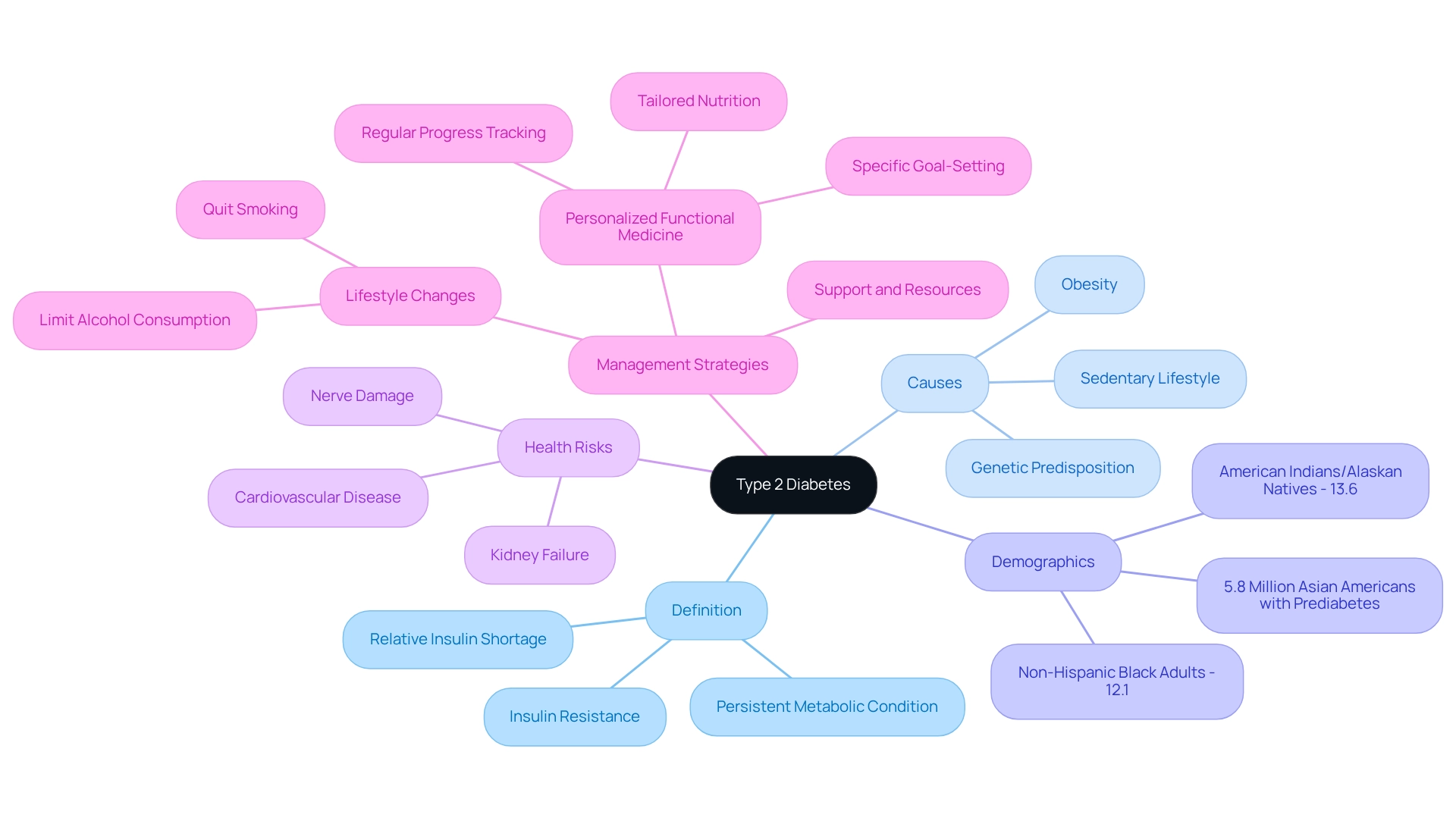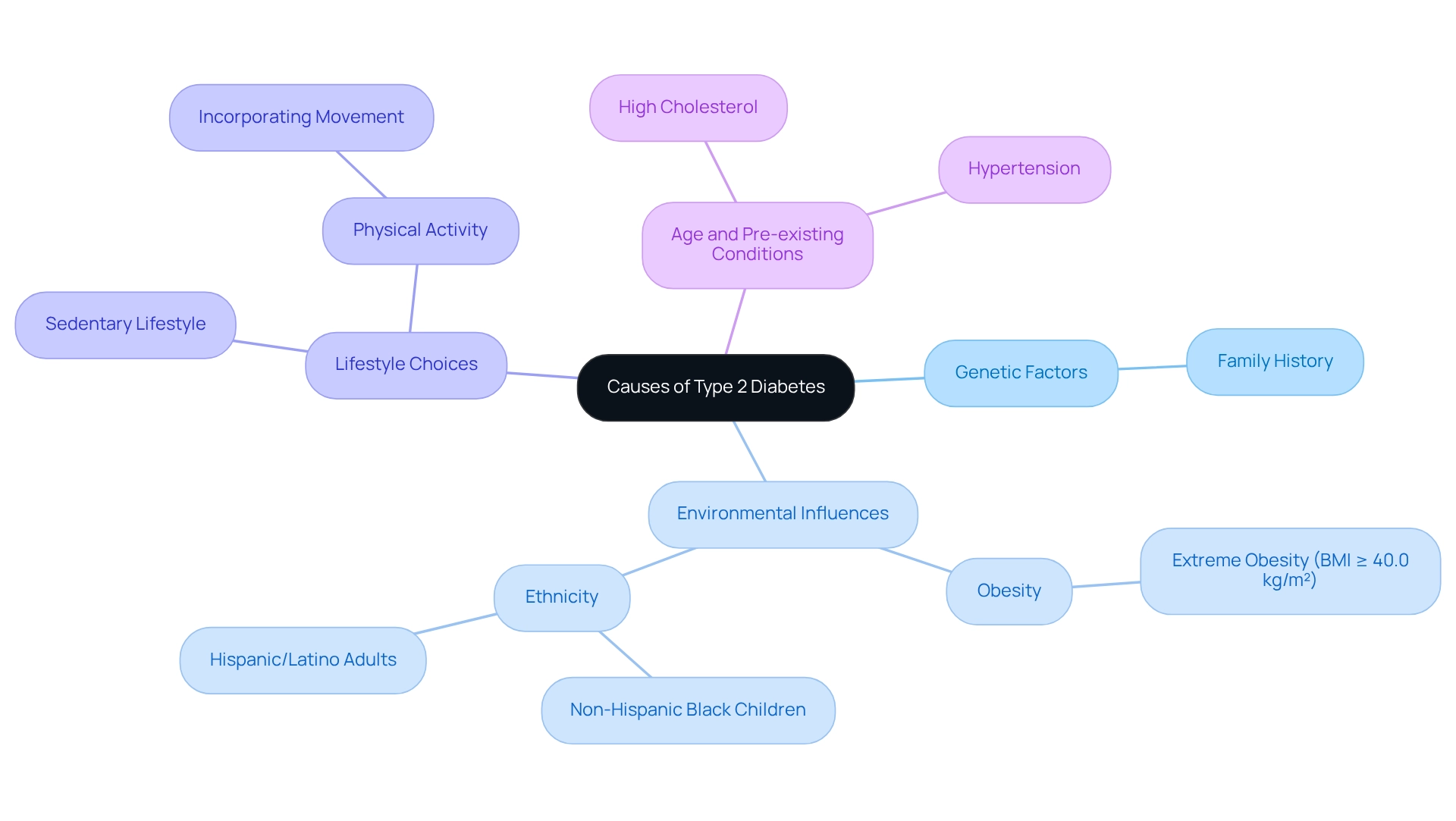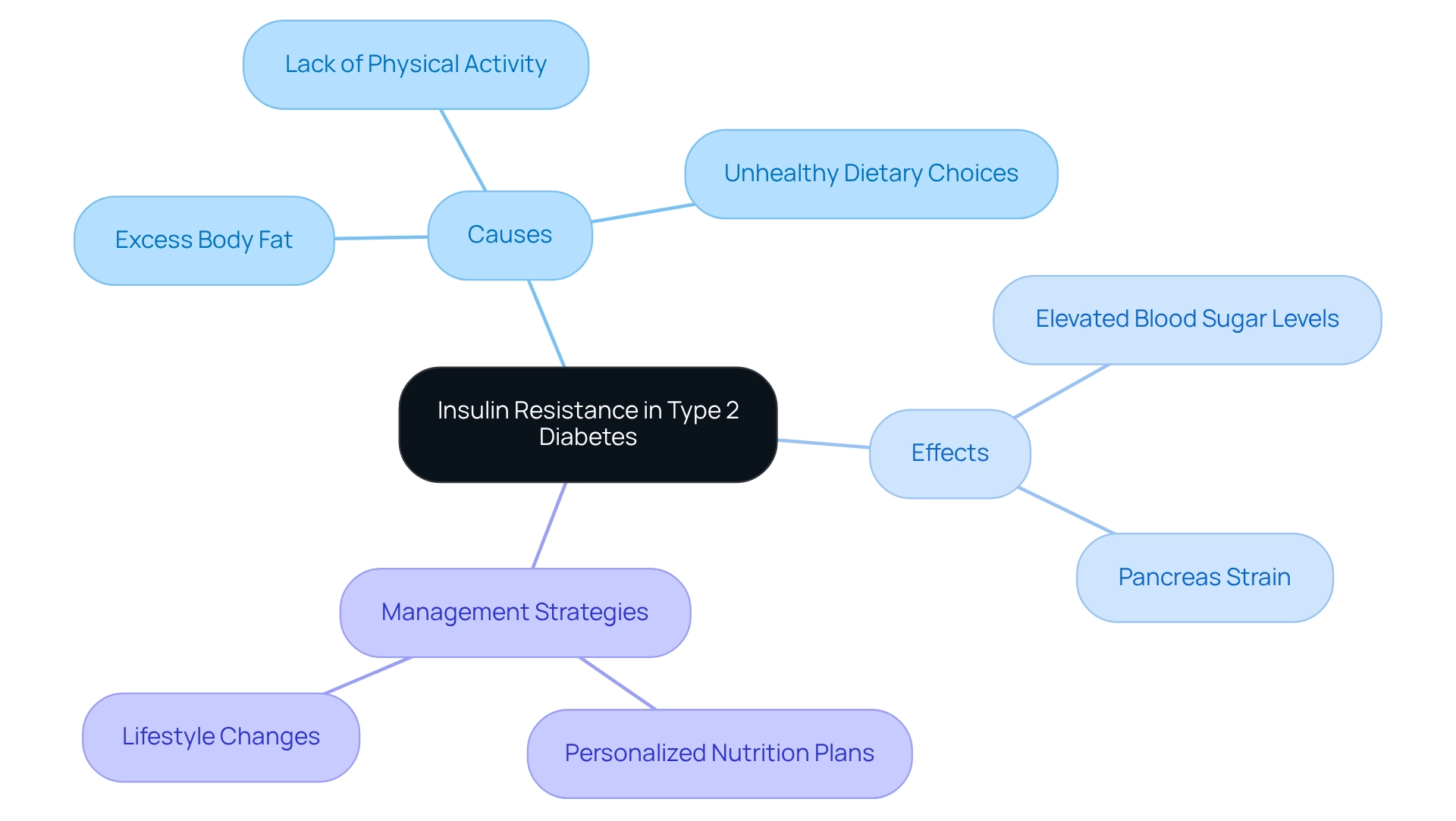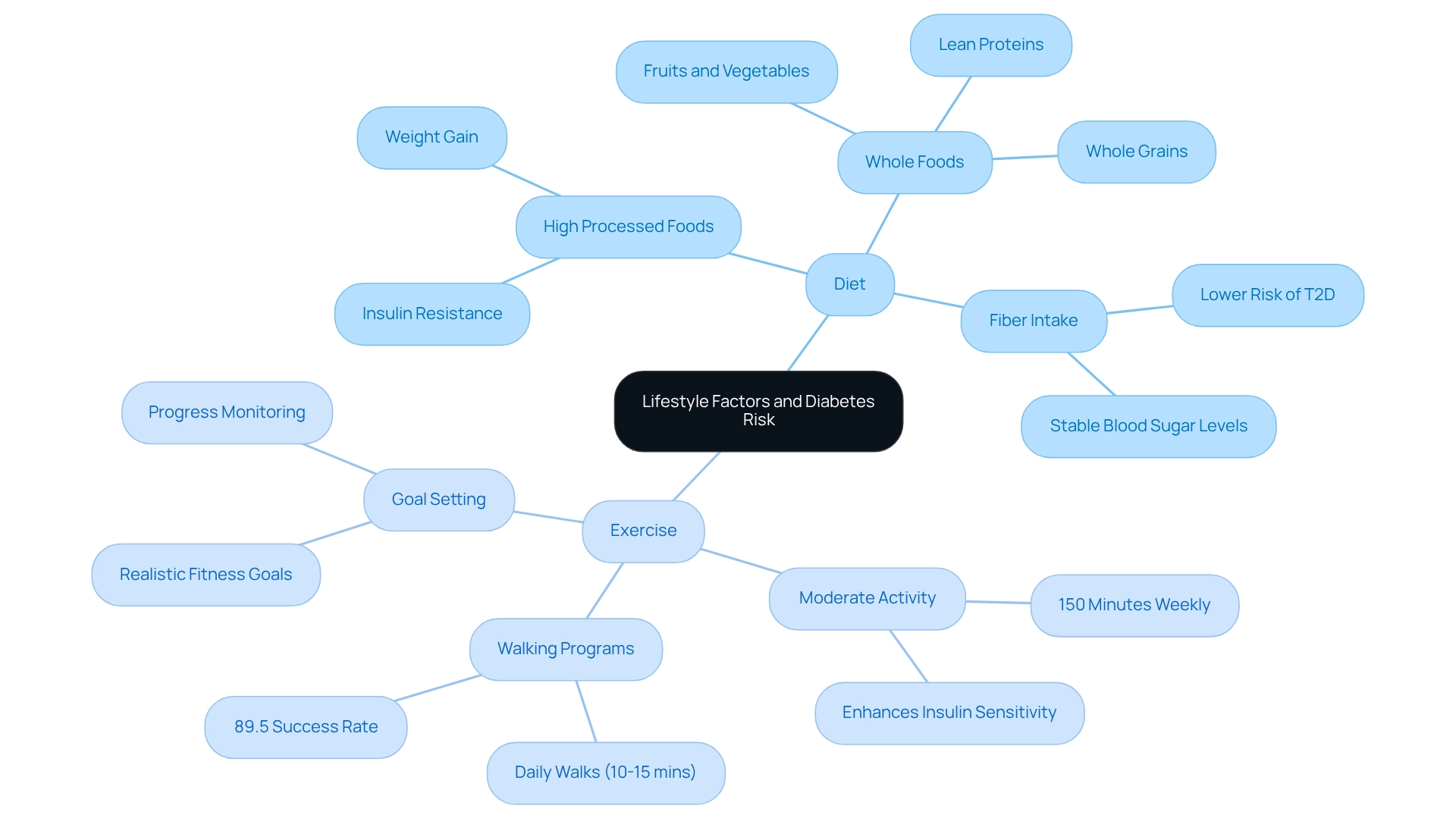Overview
Living with type 2 diabetes can be challenging, and it’s important to recognize the key factors that contribute to this condition.
- Obesity
- A sedentary lifestyle
- Genetic predisposition
- Unhealthy dietary choices
These factors play significant roles in developing insulin resistance and elevated blood sugar levels. Understanding these factors is crucial for prevention and management.
Many patients find that making lifestyle changes can significantly improve their health. By focusing on improved nutrition and increasing physical activity, you can mitigate the risk of developing type 2 diabetes. Remember, small changes can lead to big results.
It’s never too late to take control of your health. Embracing a healthier lifestyle not only helps in managing diabetes but also enhances your overall well-being. Consider taking the first step towards a healthier you with the 30-Day Diabetes Reset program.
Introduction
Type 2 diabetes is not just a health condition; it represents a complex interplay of genetics, lifestyle, and environment that affects millions of people around the world. It’s important to recognize that as the prevalence of this chronic metabolic disorder continues to rise, understanding its underlying mechanisms and risk factors becomes increasingly vital. Many patients find that the journey to managing and preventing type 2 diabetes involves a multifaceted approach. From the critical role of insulin resistance to the impact of dietary choices and exercise, there is so much to consider.
Recent statistics reveal alarming trends, particularly among diverse ethnic groups, highlighting the urgent need for tailored health interventions. By exploring the causes and examining lifestyle influences, we can embrace holistic management strategies. This is where individuals can take proactive steps toward reclaiming their health in the face of this growing epidemic. Together, we can navigate this journey and foster a healthier future.
Define Type 2 Diabetes: Understanding the Condition
Type 2 diabetes mellitus is a persistent metabolic condition that can feel overwhelming, characterized by increased blood sugar levels due to resistance to insulin and a relative shortage in its secretion. Unlike type 1 diabetes, where the pancreas fails to produce insulin, individuals with type 2 can still generate insulin, but their bodies struggle to use it effectively. This condition often develops gradually and is closely linked to what causes type 2 diabetes, such as obesity, a sedentary lifestyle, and genetic predisposition.
It’s important to recognize that recent statistics reveal approximately 5.8 million Asian Americans are diagnosed with prediabetes, highlighting the growing prevalence of this condition across diverse populations. Many patients find that the rates of diagnosed conditions related to blood sugar levels vary significantly by race and ethnicity, with American Indians and Alaskan Natives experiencing the highest prevalence at 13.6%, followed by non-Hispanic Black adults at 12.1%. These disparities emphasize the necessity for culturally specific interventions to address the unique challenges faced by various communities.
Understanding what causes type 2 diabetes is essential, as unmanaged instances can lead to serious health issues such as cardiovascular disease, nerve damage, and kidney failure. The latest research underscores the significance of lifestyle changes, such as stopping smoking and reducing alcohol intake, as vital strategies for effectively managing blood sugar levels. Dr. Jason Shumard, owner of Integrative Wellness Center, advocates for a holistic approach to diabetes management, emphasizing personalized functional medicine strategies that include tailored nutrition, regular progress tracking, and specific goal-setting methods. He shares, “By offering patients actionable insights and practical tools, the center cultivates an atmosphere where individuals can regain their wellness and well-being.”
By understanding this condition and implementing holistic strategies, individuals can take proactive steps toward reclaiming their health and well-being. Remember, you are not alone in this journey, and with the right support and resources, a healthier future is within reach.
Explore the Causes of Type 2 Diabetes: Key Factors and Influences
Understanding what causes type 2 diabetes can feel overwhelming, but it’s important to recognize that you are not alone in this struggle. The complex factors that contribute to what cause type 2 diabetes arise from a mix of genetic, environmental, and lifestyle influences. Obesity, for instance, is an important factor when considering what cause type 2 diabetes, as it can greatly increase insulin resistance. Did you know that around 15.7% of adults facing blood sugar challenges are classified as extremely obese, with a BMI of 40.0 kg/m² or more?
A sedentary lifestyle can further complicate metabolic health, making physical activity essential for prevention. Many patients find that incorporating even small amounts of movement into their daily routine can lead to positive changes. Additionally, genetic predisposition is a vital aspect; those with a family history of what cause type 2 diabetes may face a higher risk. Recent studies indicate that certain ethnic groups, particularly non-Hispanic Black children, experience the highest rates of type 2 metabolic disorder. This highlights the importance of understanding ethnicity as a risk factor. Furthermore, age and pre-existing medical conditions, such as hypertension and high cholesterol, can also influence what causes type 2 diabetes. Empowering yourself with knowledge about your health can lead to informed lifestyle choices that make a real difference. Remember, every step you take toward understanding and managing your health is a step toward a healthier future.
Examine Insulin Resistance: A Core Mechanism in Type 2 Diabetes
Resistance to insulin can be a challenging experience, as it occurs when the body’s cells become less responsive to this crucial hormone that regulates blood sugar levels. This condition often marks what causes type 2 diabetes. It’s important to recognize that as resistance increases, the pancreas tries to compensate by producing more insulin. However, over time, it may struggle to meet the body’s demands, leading to elevated blood sugar levels.
Factors contributing to this resistance often include:
- Excess body fat, particularly around the abdomen
- A lack of physical activity
- Unhealthy dietary choices
These factors are important to understand when considering what causes type 2 diabetes. Many patients find that understanding insulin resistance is essential for creating effective strategies to prevent and manage type 2 health issues.
At Integrative Wellness Center, Dr. Jason Shumard takes a holistic functional medicine approach, uncovering the root causes of insulin resistance. This empowers patients with personalized nutrition plans and effective strategies for tracking their progress. This comprehensive methodology not only addresses the physiological aspects of the condition but also fosters lifestyle changes that enhance overall metabolic health.
By engaging in this journey, you can take meaningful steps toward a healthier future. Have you considered how your daily choices impact your well-being? Together, we can navigate this path to better health, ensuring you feel supported every step of the way.
Assess Lifestyle Factors: Diet, Exercise, and Their Role in Diabetes Risk
Lifestyle elements, particularly nutrition and exercise, are crucial in understanding what cause type 2 diabetes and assessing the risk of developing this second form of the disease. It’s important to recognize that diets high in processed foods, sugars, and unhealthy fats can lead to weight gain and insulin resistance, both of which are significant risk factors for what cause type 2 diabetes. In contrast, embracing a balanced diet rich in whole foods—like fruits, vegetables, whole grains, and lean proteins—can help maintain stable blood sugar levels and support overall health. Many patients find that consuming a diet high in whole grains and fiber significantly lowers their risk of developing what cause type 2 diabetes. For instance, boosting the intake of fruits and vegetables while limiting processed foods has been shown to lower the occurrence of issues related to what cause type 2 diabetes. This aligns with findings from a walking program, which reports a success rate of 89.5% in improving wellness outcomes through structured physical activity.
Physical activity is equally essential. Participating in at least 150 minutes of moderate exercise weekly enhances insulin sensitivity and assists in weight management. Starting a walking program can be a simple yet effective way to incorporate physical activity into daily life. Individuals are encouraged to evaluate their current fitness levels and set realistic goals, such as committing to a daily walk of 10-15 minutes. Have you thought about how monitoring your progress through a journal or application can help sustain motivation and acknowledge your successes throughout this journey? By understanding and adjusting these lifestyle elements, you can significantly reduce your risk of developing conditions related to what cause type 2 diabetes and enhance your overall well-being. Real-life instances show that dietary modifications, such as adding more greens and decreasing sugar consumption, have led to successful prevention outcomes. As noted by nutrition experts, adopting healthier eating habits is a fundamental step in managing and preventing diabetes, especially when considering what cause type 2 diabetes. Furthermore, Dr. Jason Shumard’s holistic approach emphasizes incorporating these lifestyle adjustments into a broader treatment plan, empowering you to take charge of your well-being through functional medicine and patient education.
For more information on how to start your walking program and improve your health, contact Integrative Wellness Center today!
Conclusion
Understanding type 2 diabetes can feel overwhelming, but it’s important to recognize that you’re not alone in this journey. This chronic metabolic disorder arises from a complex interplay of factors, including insulin resistance, dietary choices, and physical activity. Many patients find that acknowledging the role of obesity, sedentary behavior, and genetic predisposition is crucial for effective prevention and management.
Lifestyle modifications can be a powerful ally in combating type 2 diabetes. Imagine embracing a balanced diet filled with whole foods and engaging in regular physical activity—these simple changes can significantly reduce your risk. Recent studies show that increasing your fruit and vegetable intake and incorporating exercise into your routine can lead to remarkable health improvements. Dr. Jason Shumard’s holistic approach highlights the importance of personalized strategies, empowering you to reclaim your health through informed choices.
Ultimately, the path to managing and preventing type 2 diabetes involves understanding its complexities and taking proactive steps. By addressing lifestyle factors and embracing a holistic approach, you can make meaningful strides toward improving your health and well-being. The urgency to act is clear. As we come together as a community to implement tailored health interventions, a healthier future is not just a dream—it’s an attainable goal. Remember, every small step counts, and you have the power to create positive change in your life.
Frequently Asked Questions
What is type 2 diabetes mellitus?
Type 2 diabetes mellitus is a persistent metabolic condition characterized by increased blood sugar levels due to insulin resistance and a relative shortage in insulin secretion. Unlike type 1 diabetes, individuals with type 2 can still produce insulin, but their bodies struggle to use it effectively.
What are the common causes of type 2 diabetes?
Common causes of type 2 diabetes include obesity, a sedentary lifestyle, and genetic predisposition.
How prevalent is prediabetes among Asian Americans?
Approximately 5.8 million Asian Americans are diagnosed with prediabetes, indicating a growing prevalence of this condition across diverse populations.
Which racial and ethnic groups experience the highest rates of diagnosed conditions related to blood sugar levels?
American Indians and Alaskan Natives have the highest prevalence at 13.6%, followed by non-Hispanic Black adults at 12.1%.
Why is it important to understand the causes of type 2 diabetes?
Understanding the causes of type 2 diabetes is essential because unmanaged instances can lead to serious health issues such as cardiovascular disease, nerve damage, and kidney failure.
What lifestyle changes are recommended for managing type 2 diabetes?
Recommended lifestyle changes include stopping smoking, reducing alcohol intake, and implementing other vital strategies for effectively managing blood sugar levels.
What approach does Dr. Jason Shumard advocate for diabetes management?
Dr. Jason Shumard advocates for a holistic approach to diabetes management, emphasizing personalized functional medicine strategies that include tailored nutrition, regular progress tracking, and specific goal-setting methods.
What can individuals do to reclaim their health and well-being in relation to type 2 diabetes?
Individuals can take proactive steps toward reclaiming their health and well-being by understanding the condition and implementing holistic strategies, along with seeking the right support and resources.



